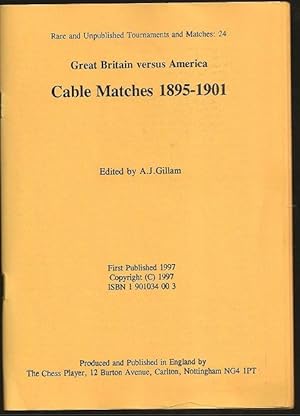Leopold Hoffer Anthony Tony Gillam (1 results)
Product Type
- All Product Types
- Books (1)
- Magazines & Periodicals
- Comics
- Sheet Music
- Art, Prints & Posters
- Photographs
- Maps
-
Manuscripts &
Paper Collectibles
Condition
- All Conditions
- New
- Used
Binding
- All Bindings
- Hardcover
- Softcover
Collectible Attributes
- First Edition
- Signed
- Dust Jacket
- Seller-Supplied Images
- Not Printed On Demand
Seller Location
Seller Rating
-
Great Britain versus America: Cable Matches 1895-1901
Published by The Chess Player, Nottingham, 1997
ISBN 10: 1901034003ISBN 13: 9781901034004
Seller: The Book Collector, Inc. ABAA, ILAB, Fort Worth, TX, U.S.A.
Book First Edition
Soft cover. Condition: Very Good. 1st Edition. 71+[1 ad] pages with illustrations, tables and diagrams. Octavo (8 1/4" x 5 3/4") bound in original publisher's yellow wrappers. Rare and unpublished Tournament and Matches number 24. First edition. The Anglo-American cable chess matches were a series of yearly chess matches between teams from the United States and Great Britain conducted over transatlantic cable from 1896 to 1911, except for the three-year gap of 1904 to 1906 when no matches were held. This series was closely contested, with each team winning six matches and one match being drawn. The individual game total over the series was also even (+39 −39 =50). The series ended when Great Britain won their third consecutive match, thereby earning permanent custody of the silver cup provided by Sir George Newnes. There were other cable matches held in the late 19th and early 20th centuries, but this series is the most well-known. The first attempt at a same-session cable match and the direct predecessor of the Anglo-American series was a match between the British Chess Club and the Manhattan Chess Club on 9 March 1895. Only one of the ten games concluded by the time the London hall was required to close, a draw being agreed. Emanuel Lasker, charged with adjudicating unfinished games, suggested draws on the nine remaining boards and this was acceptable to both clubs. Drawing on experience with the 1895 cable match played by the Manhattan club, the Brooklyn Chess Club organized the first Anglo-American chess match. Participation was restricted to native citizens, and play was held for two four-hour sessions per day over two days. The time limit was 20 moves per hour. The Brooklyn club suggested eight players per team and the British club preferred ten players per team. The first match in 1896 used eight players per team, but all subsequent matches used ten players per team. As before, Emanuel Lasker would adjudicate any unfinished games, although over the course of the series adjudication would not be required until the tenth match of the series. Sir George Newnes was president of the British Chess Club and he provided the silver cup that would go to the winning team until the next match. The first match of the series was held 13 14 March 1896. The United States team had white on the odd-numbered boards and the British team had white on the even-numbered boards. The United States team won by a single game. The 1897 match was held 12 13 February 1897. The British team had white on the odd-numbered boards and the United States team had white on the even-numbered boards. The British team won by a single game, tying the series at one match each. The third match was held 18 19 March 1898. The United States team had white on the odd-numbered boards and the British team had white on the even-numbered boards. The British team won the match by a single game, taking the lead in the series two matches to one, and positioning themselves to end the series and take permanent possession of the Newnes cup should they win the 1899 match for three consecutive match wins. The 1899 match was held 11 12 March 1899. The British team had white on odd-numbered boards and the United States team had white on even-numbered boards. The United States team won by a margin of two games, tying the series at two matches each. The 1901 match was held 19 20 April 1901. The British team had white on the odd-numbered boards and the United States team had white on the even-numbered boards. The match was tied at five games each. As the United States team did not win three consecutive matches, the series was not ended. Prominent players from both sides of the Atlantic would participate over the years. Some who played for Great Britain included Joseph Blackburne, Amos Burn, Henry Bird, Henry Atkins, Horatio Caro, James Mason, Frederick Yates, Sir George Thomas, and Thomas Lawrence. Some who played for the United States included Harry Pillsbury, Jackson Showalter, Frank Marshall, Albert Hodges, etal. Conditi.


